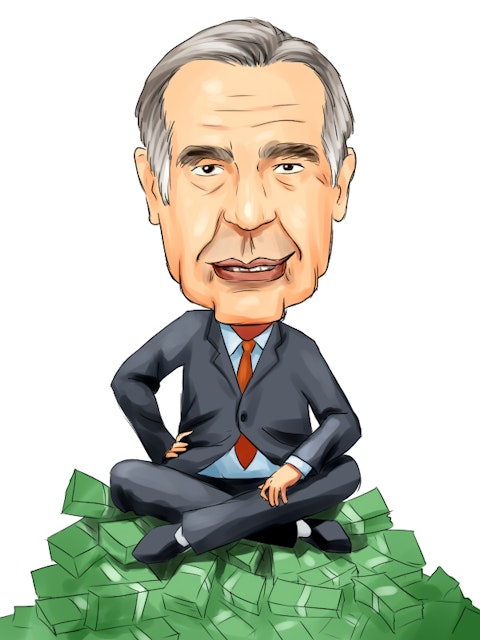In this article, we will take a detailed look at the 15 most feared activist hedge funds.
Activist investors are a force to reckon with, given their profound impact on companies worldwide and their influence on investor’s actions. They stand out from normal investors in buying large stakes in publicly traded companies to effect changes that they believe will unlock additional value.
While public pension funds and mutual funds also participate in stock activism, activist hedge funds often hold significant positions and use extra leverage from derivatives such as stock options to compensate for the costs of such campaigns. Additionally, activist hedge funds acquire positions in struggling companies just before advocating for change, aiming to benefit from the ensuing improvement and increase in stock value.
Activist investors declare their initiatives by submitting a Schedule 13D form to the U.S. Securities and Exchange Commission (SEC), which must be submitted within ten days after acquiring 5% or more of a company’s voting class shares. They often initiate their campaigns for board positions in the early months of the year, as they prefer to introduce new members to the board just before the company’s annual general meeting they aim to influence.
READ ALSO: Shake-Up Alert: 40 Companies Facing Activist Pressure.
In contrast to private equity groups that purchase and transform businesses to make a profit upon their sale, activist investors rarely obtain complete or controlling ownership. Instead, they rely on public statements and confidential talks to gain support from other shareholders and within the company. Should these strategies not succeed, an activist investor might seek a proxy battle to install new board members, aiming to compel the company to fulfill their requests.
A company might attract the attention of the most feared activist hedge funds if it needs to be better managed or has high expenses. In some cases, it might be targeted if the investors wish to take the company private or plan to push for the sale of some units as one way of unlocking additional value. It might also be targeted if the activist investors believe it is a problem they can fix to generate more value.
While activist hedge funds’ modest goal may be to advise company management, in most cases, they are known for their aggressive actions. They push for seats on the board as one of the ways of influencing a company’s strategic direction through decision-making. Some activist investors have gained prominence for forcefully entering into failing businesses and subsequently pushing for management changes, warning off board members—and occasionally, even CEOs.
However, the majority of activist campaigns take place behind the scenes. Roughly two-thirds of the battles occur behind closed doors, whereby agreements are reached without the public ever knowing. It’s only when activist hedge funds or investors feel they are getting a cold shoulder from management or board that they go public in a bid to win shareholders’ support.
Elliott Management is arguably one of the most feared activist hedge funds as it has targeted some of the biggest companies and taken on some of the most prominent investors, including Warren Buffett. Nevertheless, it is not the only one in the highly competitive field, as Starboard Value L.P. and Trian Partners, among others, are always looked upon by investors looking for highly undervalued stocks with tremendous upside potential.
2023 was one of the most successful years for activist hedge funds as they roared back to life on losing an average of 16% in 2022. As the overall stock market turned bullish in 2023, with the S&P 500 rallying by 24%, activist investors generated an average return of 20.2%, erasing a significant chunk of the losses accrued in 2022.
Some of the most feared activist hedge funds that came out on top included Value Act Capital, which posted a return of 39% better than the S&P 500. Caligan Partners was also up by 37% and Engaged Capital posted a return of 29%.
As interest rate hikes and other factors slowing growth hurt some companies, activist investors successfully pushed for cost cuts, management changes, and strategic alternatives. Many boards only realized too late that it takes more than refreshing directors to offset down performance in today’s climate.
In the first six months of 2024, the 15 most feared activist hedge funds launched a record number of campaigns. Investment firm Barclays tracked 147 activist campaigns, a new record from the previous high of 143 campaigns in the first half of 2018. In the second quarter alone, there were 86 campaigns, with Elliott Management launching 11 campaigns and committing close to $11 billion in capital.
The increased activist campaigns threaten to trigger costly battles between activist shareholders and management amid the push for leadership changes, spin-offs, and outright sales of underperforming companies or units.

Our Methodology
After sifting through numerous media reports from the past and the present, we curated a list of the most prominent activist investors. We then picked the hedge funds with the largest portfolios and ranked them in ascending order of their portfolio sizes, as of Q1 2024.
At Insider Monkey we are obsessed with the stocks that hedge funds pile into. The reason is simple: our research has shown that we can outperform the market by imitating the top stock picks of the best hedge funds. Our quarterly newsletter’s strategy selects 14 small-cap and large-cap stocks every quarter and has returned 275% since May 2014, beating its benchmark by 150 percentage points (see more details here).
15 Most Feared Activist Hedge Funds
15. Engine No. 1
Portfolio size: $84.48 Million
Founded in 2020 by Christopher James, Engine No1 is one of the most feared activist hedge funds on Wall Street and the smallest given the size of its portfolio. The hedge fund controlled about $84.48 million worth of portfolio at the end of the first quarter of 2024.
The little-known hedge fund burst into the scene in 2021 as it pushed for board seats at oil giant Exxon Mobil Corporation (NYSE:XOM) despite holding a 0.02% stake. Ultimately, it ended up securing three seats on the board, gaining the much-needed say to influence Exxon Mobil Corporation (NYSE:XOM)’s decision-making process, especially concerning climate change matters.
The prolonged proxy battle garnered support from prominent investors like BlackRock and Vanguard. These actions differentiate them from the strategy that propelled Engine No. 1 to prominence: its powerful and effective battle against Exxon Mobil Corporation (NYSE:XOM). It made other companies and their consultants nervous and highlighted a new category of small yet assertive activist shareholders capable of securing tiny shares and advocating for modifications.
Nevertheless, the hedge fund has always insisted that public proxy fights as part of stock activism are not core to its strategy. Instead, the chief investment officer and founder, Chris James, insists they operate as average investors with activism a toll of last resort rather than a core strategy.
14. Barington Capital Group
Portfolio Value: $101.58 Million
Established in January 2000 by James A. Mitarotonda, Barington Capital Group is one of the 15 most feared activist hedge funds. It boasts of a highly diversified portfolio worth $101.58 million. The activist hedge fund primarily invests in industrial stocks, with consumer cyclical stocks like Mattel Inc (NASDAQ:MAT) and technology stocks accounting for a significant chunk of the portfolio.
It focuses on investing in companies whose stock prices are undervalued, expecting a substantial increase in value due to changes in business strategy, operational enhancements, better allocation of capital, or improved governance.
Over the past year, the hedge fund has launched a series of activist campaigns, one at toymaker Mattel Inc (NASDAQ:MAT), which includes pushing the company to divest its Fisher-Price and American Girl brands and separating the CEO role from the chairman. Barrington is also pushing TriMas Corporation (NASDAQ:TRS) to focus on the packaging business and divest non-core units as one of the ways of generating some value while focusing on the core business.
Leveraging its broad experience in strategy, operations, and board meetings, the activist hedge fund also advocates divesting some business units in companies in which it gets involved, like Mattel Inc (NASDAQ:MAT). The divestment strategy is part of eliminating underperforming units to ensure a company focuses on the core business that generates more value.
13. Engaged Capital
Portfolio Size: $617.10 million.
Engaged Capital is one of the most feared activist hedge funds focusing on constructive activism tailored towards delivering superior long-term risk-adjusted returns for shareholders. Founded in 2012 by Glenn Welling, it started with an initial investment of $85 million. It currently controls a portfolio worth $617.10 million with holdings in technology services and consumer cyclical sectors.
Engaged capital activism focuses on underperforming companies trading below their fair value, such as V.F. Corporation (NYSE:VFC). The activist hedge fund gets involved by acquiring significant stakes and pushing for corporate governance policies to enhance shareholder value. It also advocates for management changes as one of the ways of getting its preferred candidates with the experience and expertise to reinvigorate growth prospects.
The activist hedge fund also pushes for operational improvements and cost reduction, as at V.F. Corporation (NYSE:VFC), to bolster profit margins and generate optimum shareholder value. In some cases, it advocates for strategic reviews that include selling non-core assets or the entire business if it’s the only option left to generate value. Board refreshment, including pushing for seats on the board, is also part of the strategy that the hedge fund deploys to try and advocate for change and influence a company’s direction to unlock any hidden value.
The small-cap investor that makes investments with a two or five-year investment horizon has targeted consumer footwear and apparel maker V.F. Corporation (NYSE:VFC). It is pushing the company to consider reducing operational costs and restoring brand autonomy.
Engaged Capital is also pushing debt collection company PRA Group, Inc. (NASDAQ:PRAA) to focus on improving its operations, cutting costs, and adding new experience to its leadership as part of its activist campaign.
12. Jana Partners
Portfolio Size: $1.83 billion
Founded in 2001, Jana Partners is one of the most feared activist hedge funds focusing on companies changing and needing operational improvement. Founded by Barry Rosenstein, the hedge fund buys significant stakes in companies it believes are underperforming and starts pushing for changes that will help improve performance, as is the case at Wolfspeed, Inc. (NYSE:WOLF).
The activist hedge fund earned its reputation by adopting stances backed by thorough research and detailed strategies for long-term growth. Rosenstein refers to this approach as V cubed a three-pronged plan. Value is the first strategy that entails acquiring assets at the optimal price; Votes: understanding your position in the voting process before initiating a proxy battle; and Variety of strategies: employing multiple approaches to increase value and facilitate the exit from an investment.
Since 2008, the company has progressively moved away from this approach, adopting a new strategy described as the three “Shs,” which include Stock price – acquiring assets at the right price; Strategic activism like the campaign at Wolfspeed, Inc. (NYSE:WOLF) – either selling the company or divesting a business unit; and Star advisors/nominees – partnering with leading figures in the industry to provide advice and secure board positions if needed.Its activist campaign pushes for board seats and calls for selling some units or the entire business.
The hedge fund returned 31% in 2023 as it went for changes at Whole Foods and Frontier Communication. Its returns were bolstered by a successful activist campaign at Freshpet, Inc. (NASDAQ:FRPT), where it secured board seats, and at software company New Relic. Jana Partners has also sent a letter to Wolfspeed, Inc. (NYSE:WOLF) urging the company to review strategic alternatives, including selling the entire company.
11. Corvex Capital
Portfolio Size: $2.16 Billion
Founded by Keith Meister in December 2010, Corvex Capital is one of the most feared activist hedge funds. It follows a core strategy based on values, using its ability to participate actively in situations to find opportunities with high risk reward opportunities like Algonquin Power & Utilities Corp. (NYSE:AQN). Consequently, it invests in high-quality companies adapting to changes in their industries, which are supported by long-term positive trends.
Corvex is a highly focused, deeply motivated investment fund that employs activism as a method but not as its primary approach. The company leans towards not adopting an activist stance, considering a proxy battle as a measure of last resort. It favors a cooperative approach, aiming to be welcomed onto boards like at Algonquin Power & Utilities Corp. (NYSE:AQN).
However, when management gives it a cold shoulder, the hedge fund often engages in public activism as one of the ways of getting shareholders on board to push for changes that can unlock additional value. The activist hedge fund does not take positions to micromanage companies but to influence the strategic direction through cost cuts, unit sales, or divestments.
After taking a 4.4% stake in Entain, the activist hedge fund called for changes in the company’s strategic direction to improve its performance; the hedge fund has also taken an activist position at Algonquin Power & Utilities Corp. (NYSE:AQN), whereby it is in discussion with the board about pursuing strategic changes that could unlock value. The activist hedge fund has also taken a position at Vestis Corporation (NYSE:VSTS), a provider of uniform rentals and workplace supplies, with plans that could open the door for it to push for board seats.
10. Sachem Head Capital
Portfolio Value: $2.34 billion
New York-based Sachem Head Capital is an oriented investment management firm that also engages in activist investment to unlock shareholder value. Founded in 2012 by Scott Fergusson, it boasts a portfolio value of $2.34 billion, primarily invested in basic materials and technology stocks, including Twilio Inc. (NYSE:TWLO).
Sachem Head’s investment strategy is focused on value-oriented, concentrated long/short investments with an activist overlay. The hedge fund first became known in the activist scene in 2020 when it invested in Olin and pushed for a board seat as it sought to tweak the company’s strategic direction. It followed the trend by going for three board seats at U.S. Food.
The push for board seats, as at Twilio Inc. (NYSE:TWLO), has always been Sachem Head Capital’s go-to activist investment strategy that focuses on influencing the decision-making process to generate more shareholder value.
Ferguson is on record saying that the most challenging part for activist investors is replacing CEOs in companies where they get involved. The activist hedge fund has previously taken stakes in chemicals company Olin Corporation (NYSE:OLN). Recently, the hedge fund has built a 3.6% stake in Delivery Hero and is seeking a seat on the board as part of its activist campaign. At Twilio Inc. (NYSE:TWLO), the activist hedge fund is pushing for board seats to ensure the company turns its first profit after years of loss-making despite revenue growth.





